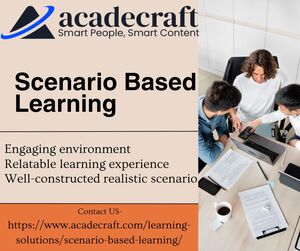More from Abhishek Acadecraft
More in Politics
Related Blogs
Archives
Social Share
How Scenario-Based Learning Aligns with Current Educational Trends?
Body
In the age of the fast growing educational landscape, old teaching methods are providing ways for innovative approaches that prioritize active engagement and real-world application of knowledge. One such approach gaining significant traction is Scenario-Based Learning (SBL). This instructional strategy, which involves placing learners in realistic, problem-solving situations, is proving to be a perfect fit with many of the current trends in education.
Scenario Based Learning & Educational Trends
One of the most notable trends in education today is the shift from passive to active learning. Scenario-based learning is inherently active, requiring students to engage deeply with the material as they navigate complex scenarios. This approach not only enhances understanding but also helps to develop necessary skills.
Emphasis on Real-World Relevance
Modern education is the emphasis on real-world relevance. Educators are increasingly focusing on teaching skills and knowledge that students can directly apply in their personal and professional lives. Scenario based learning aligns perfectly with this trend, as it immerses learners in realistic situations that mimic real-life challenges. This relevance helps students see the value in what they are learning, increasing motivation and engagement.
Focus on Soft Skills Development
Today's educational trends also place a strong emphasis on the development of soft skills, such as communication, collaboration, and emotional intelligence. Scenario-based learning is particularly effective in this regard, as it often involves group activities and role-playing that require students to work together, communicate effectively, and navigate social dynamics. That helps to build essential soft skills that are highly valued in the modern workforce.
Personalized Learning Paths
Personalized learning is important in education, with a growing recognition that each student has unique needs, strengths, and learning styles. Scenario based learning supports personalized learning by allowing educators to tailor scenarios to the individual needs of their students. This flexibility ensures that all learners can engage with the material in a way that is most meaningful to them, enhancing both motivation and achievement.
Continuous Assessment and Feedback
Continuous assessment and feedback are vital components of effective education, enabling students to understand their progress and identify areas for improvement. Scenario-Based Learning facilitates this through ongoing assessment opportunities embedded within scenarios. As students make decisions and solve problems, they receive immediate feedback that helps them learn and grow. This continuous feedback loop is essential for mastery and long-term retention of knowledge and skills.
Promoting Lifelong Learning
Lifelong learning is a fundamental trend in today's educational landscape, emphasizing the importance of continuous personal and professional development. SBL promotes lifelong learning by fostering a mindset of curiosity and continuous improvement. By engaging students in realistic scenarios that require ongoing learning and adaptation, SBL helps to instill a love of learning that extends beyond the classroom.
Implementing Scenario-Based Learning in Modern Education
Given its alignment with current educational trends, it is no surprise that many educators are eager to implement Scenario based eLearning in their classrooms. Here are some strategies for effectively integrating SBL into modern education:
- Start Small: Begin with simple scenarios that are directly related to the course material. As both you and your students become more comfortable with this approach, you can gradually introduce more complex scenarios.
- Leverage Technology: Utilize digital tools and platforms to create immersive and interactive scenarios. Virtual reality, simulations, and online collaborative tools can enhance the SBL experience.
- Collaborate with Colleagues: Work with other educators to develop and refine scenarios.
- Incorporate Real-World Examples: Use real-world examples and case studies to create scenarios that are relevant and engaging for students.
- Provide Clear Instructions and Support: Ensure that students understand the objectives and expectations of the scenarios. Provide guidance and support as they navigate the scenarios, helping them to stay on track and achieve their learning goals.
Summary
Scenario-Based Learning is more than just a teaching strategy; it is a powerful tool that aligns perfectly with many of the current trends in education. By promoting active learning, real-world relevance, technology integration, soft skills development, personalized learning paths, continuous assessment, and lifelong learning, SBL offers a comprehensive approach to education that meets the needs of today's learners.















Comments